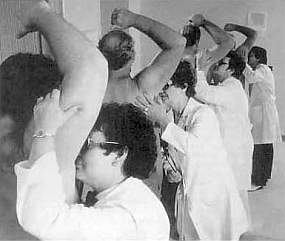A reader wrote to ask a question I thought was important, so I want to post a response here.
The gist of that multipart question:
How do I make sense of the mishmash of voices/teachings/ideas/admonitions I hear in the Christian Church today? How can it all be reconciled? A respected Christian pastor on the radio says one thing, while a famous Christian author writes something different. Denominations don’t agree. How do I know who is right and who isn’t?
That’s a difficult question. What I share below is what I believe. It’s how I handle that same question, because each of us needs to find a way to deal with the flood of information that bombards us daily. Even Christian information. We live in strange times awash in more information and data in one day than most people used to encounter in a lifetime. Making sense of it all is a monumental task.
1. Recognize that each of us is on a journey of faith—and we have not yet arrived at journey’s end.
One thing that bothers me most about Western Christianity is our mania concerning incompleteness. If we were to read a novel that had many interesting ideas woven through the narrative but which lacked a final chapter, many of us would tear out our hair in frustration. The fact that many wonderful events occurred in the book or that we learned intriguing things along the way pales against the angst of not knowing if the hero vanquished his foe or if the heroine overcame her circumstances.
Your story and mine are not yet complete. The final chapter hasn’t been written, nor all the events played out. We’re still journeying through the narrative of our lives.
And that journey is being orchestrated by God Himself.
Since God is writing our story, since He is planning our journey, we can be at peace with incompleteness if we allow God to do His work in our lives.
One of the Scriptures that brings me great comfort when I want to rush toward what I think is the right destination in my journey is this:
He [God] has made everything beautiful in its time. Also, he has put eternity into man’s heart, yet so that he cannot find out what God has done from the beginning to the end.
—Ecclesiastes 3:11
My timing is not His timing. Only His timing is perfect. What God has done is too wondrous for me to grasp, so full and rich as to be beyond me.
And I can be at peace with that, if I choose to be.
Paul puts it this way in the New Testament:
For now we see in a mirror dimly, but then face to face. Now I know in part; then I shall know fully, even as I have been fully known.
—1 Corinthians 13:12
What’s around the bend in the river? That conjecture drives some people to distraction and worry. In some cases, it even causes people to abandon the journey.
But the real answer to what’s around that bend? God. Which is why worrying is fruitless. God is there in the parts of the path we can’t see, so we are sheltered no matter where we are in the journey.
2. Recognize that each person is on a different part of the journey of faith.
Something in our cultural makeup assumes that everyone must be on our same faith journey and be just as far along as we are.
Honestly, that’s just pride. And that pride manifests as judging people who don’t measure up.
Here’s a reality check: Every famous Christian you and I admire, every pastor, every teacher, every author, all of them are flawed. None are or were fully complete this side of heaven. Each was someplace along that pathway that defines the journey of faith, and the likelihood is that their stations along the way will not always align with ours.
Our problem is that we expect those waystations to align despite the fact that each of us is a unique individual with unique sins, a unique past, unique gifts, and a unique perspective on the journey. Our destination may be the same, but how we get there is unique to what God wants do through us for His glory.
When I encounter another Christian, the worst thing I can assume about him is that his journey has been identical to mine, that he’s gone just as far as I have, and that he’s standing alongside me on the path. When I do that, I completely mangle his story to fit mine. Or else I throw up my hands at his travel log of experiences and claim he’s on the wrong journey.
Again, that’s pride. It makes me the arbiter of all reality, places me at the center of the universe, and leaves God out of the business of managing other people’s journeys.
If you grew up in a loving home with a devoted father who loved you immensely, how weird would it be for some fellow believer to insist that you must have a problem with the fatherhood of God because everyone has a problem with their earthly fathers, and those problems taint our perspective of our heavenly one? How likely would it be that this insistent person had a problem with his own earthly father?
Yet this sort of thing is repeated daily a million times over on a million different scales within the Christian Church today. That insistent person made an assumption about your journey.
Now it may be that instead of a great earthly father, yours was a nightmare. If that’s the case, then this insistent person will seem like a breath of fresh air. Great! Thank God for that. But if not, then just realize that people are in different places on their journey. That seems so obvious, yet the confusion out there says we fail to understand that truth.
The greatest Christians we can cite were at one point lost. At one point they struggled with the lordship of Jesus in all aspects of life. At one point they got some doctrine wrong. People like Martin Luther, Charles Spurgeon, Amy Carmichael, Gladys Alward, Watchman Nee, A.W. Tozer, Corrie Ten Boom, C.S. Lewis, Jack Hayford, Chuck Swindoll, and Francis Chan were at some point wrong more often than right. But each learned and grew in God’s grace.
Can you imagine encountering Martin Luther as a young man today? He’d probably seem like a basketcase. But look how his journey unfolded!
How arrogant we can be when we judge by our standards rather than nurture by God’s!
3. Make peace with paradox, mystery, and the dim mirror, but never give up wanting to understand more.
One aspect of Western Christian I am increasingly willing to move off center stage is scientific rationalism. We in the West approach every part of life with the scrutiny and logic of Mr. Spock. Problem is, as any fan of Star Trek will tell you, Mr. Spock often missed the point, and instead those wacky, paradoxical humans saved the day.
We want to shoehorn our faith into systematic theologies and logic. We want God to conform to manmade standards. We hate thinking that Paul is right about the dim mirror. We want our faith to make sense at all times and in all places before all people.
But consider this: Jesus Christ is both fully man and fully God.
Or another: The infinite God of the universe dwells in finite believers.
Or another: You will live forever.
Mind blown? Well, it should be.
Our problem in North America 2011 is that we’ve stymied our willingness to wonder. And when you kill wonder and mystery, all that’s left is bitter argument.
It’s okay not to know it all. God is not going to slay us if we can’t resolve some of the paradoxical or mysterious aspects of the Christian faith. He’s not going to keep us out of heaven if we don’t understand the nuances of infralapsarianism. You and I can rest assured that even if we don’t fully get it, God does, and that’s just fine.
That said, God doesn’t want us to be mired 24/7/365 whimsically pondering how the stars speak forth praise. Sometimes, Mr. Spock’s logic saved the Enterprise from certain doom. Growing some head knowledge about our faith is just as needed as heart knowledge and a place for mystery, wonder, and awe.
So it’s okay if not everything you and I hear aligns. Again, our journeys are different and so are those of the people who speak to us. And sometimes, while two voices seem to be at irreconcilable odds, they may not be, especially as we gain a bit more wisdom down the path of our journey. It’s amazing what a little experience can do when it comes to making the seemingly impossible possible.
4. Get discernment by learning how to properly apply revelation from God.
This is the more nuts and bolts part of the post.
God speaks to us in the following ways:
Through the general revelation of His created world.
Through the special revelation of the Scriptures.
Through the personal and intimate revelation of His Holy Spirit indwelling us.
Where Christians go astray is when they downplay one of those three or punt one entirely. Yet all three are critical for proper discernment of truth. One will never contradict the other, and all three work together to reveal truth.
In Romans 1 we read that men are without excuse before God because of the revelation inherent in the created order. When we look at the world around us, it speaks of God.
That should blow our minds. That it doesn’t blow the minds of some Christians is one reason why people lose their ability to wonder. And wonder is an essential part of faith that keeps us from falling into easy arguments.
The Scriptures have been given to us to show the part of God’s story that can’t be fully explained by the created world. They are not only a far richer source of truth than the created world—and more obvious in their implications, too—but the Scriptures form the backbone of our practice of the Faith itself. They reveal who Jesus is and show us how we can know Him. The Bible is our essential equipping tool:
All Scripture is breathed out by God and profitable for teaching, for reproof, for correction, and for training in righteousness, that the man of God may be competent, equipped for every good work.
—2 Timothy 3:16-17
But while it is one thing to equip a person for ministry, it is quite another to direct him. This is why we have the Holy Spirit in us. The Holy Spirit is not only our seal of salvation, but He is the one who makes sense of what we know from the Bible in such a way as to apply it correctly. The Holy Spirit’s revelation takes the general purpose instructions of the Bible and shows us how to apply them in specific circumstances not specifically addressed in the Scriptures. The Holy Spirit makes sense of the spiritual world for us and leads us in everything.
So, to be discerning, we must do the following:
Be observant of the natural world.
Study and know the Scriptures.
Learn to listen to and obey the voice of the Holy Spirit.
Most churches and denominations do one of those three well, are passable in a second, and tend to forget the third. We’re not allowed the “luxury” of not handling all three fully and properly, though.
Oddly enough, our failures to heed all three contribute to the host of conflicting voices in the Christian Church. When one teacher is talking about the Bible being the only genuine source of revelation and another teacher stresses we have to learn to listen to the Holy Spirit, it sounds like a clash. It’s not, though. It’s just men failing to live up to the entire calling of the Lord.
This lack tends to force us into piecemeal study of forms of revelation and how we should use them. That’s not optimal, but finding a church in North America that handles all revelation well is not easy, sad to say. It should be easy, but we Westerners tend to latch onto what appeals to us most and forget everything else. That failing explains in part the thousands of different Christian denominations out there. If we understand this, we can make peace with it, even if it’s not ideal.
5. Know that God loves you and will keep you.
I think the greatest fear in those who ask the questions that start this post is that God is somehow not good enough to protect them and keep them unto salvation and knowledge of Him.
But God does love you and me. This is what the Paul writes:
And I am sure of this, that he who began a good work in you will bring it to completion at the day of Jesus Christ.
—Philippians 1:6
And this is what the Lord Jesus says to you from His own lips:
“And behold, I am with you always, to the end of the age.”
—Matthew 28:20b
He will never leave us or forsake us. He is faithful when we aren’t. He loves us even when we see through a dim mirror and miss our turn on the path. He will see us through to the end.
Do we believe that? If we do, then we will not fear, even when the voices around us grow confusing.
I hope this helps.
Lastly, humility must permeate it all. If we recognize that we are dust (and others are too), it helps us put all of learning into perspective. Our teachers will often fail, but that’s okay because the riches of God are so vast that no one teacher will ever enlighten us. That’s God’s work, because He is not limited. Draw close to Him, and learn from His Son by the Holy Spirit, and your path will be made straight.

 What really bugged me as I thought about this passage is that I’m no longer certain if the Church in America today smells any different than the world.
What really bugged me as I thought about this passage is that I’m no longer certain if the Church in America today smells any different than the world.